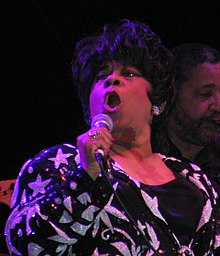Portal:Rhythm and blues
Introduction

Rhythm and blues, frequently abbreviated as R&B or R'n'B, is a genre of popular music that originated within African-American communities in the 1940s. The term was originally used by record companies to describe recordings marketed predominantly to African Americans, at a time when "rocking, jazz based music ... [with a] heavy, insistent beat" was becoming more popular. In the commercial rhythm and blues music typical of the 1950s through the 1970s, the bands usually consisted of a piano, one or two guitars, bass, drums, one or more saxophones, and sometimes background vocalists. R&B lyrical themes often encapsulate the African-American history and experience of pain and the quest for freedom and joy, as well as triumphs and failures in terms of societal racism, oppression, relationships, economics, and aspirations.
The term "rhythm and blues" has undergone a number of shifts in meaning. In the early 1950s, it was frequently applied to blues records. Starting in the mid-1950s, after this style of music had contributed to the development of rock and roll, the term "R&B" became used in a wider context. It referred to music styles that developed from and incorporated electric blues, as well as gospel and soul music. From 1960s to 70s, some British groups were referred to and promoted as being R&B bands. By the 1970s, the term "rhythm and blues" had changed once again and was used as a blanket term for soul and funk. (Full article...)
Selected article
Sons of Soul is the third album by American R&B band Tony! Toni! Toné!, released on June 22, 1993, by Wing Records and Mercury Records. It follows the success of their 1990 album The Revival, which had extended their popularity beyond R&B audiences and into the mainstream.
The band originally held recording sessions for Sons of Soul at several studios in California, including Westlake Recording Studios in Hollywood and Paradise Recording Studio in Sacramento. When they became jaded with the various people frequenting those studios, Tony! Toni! Toné! moved their sessions to Caribbean Sound Basin in Trinidad, where they ultimately wrote and recorded most of the album. It was produced entirely by the group, who worked with various session musicians and utilized both vintage and contemporary recording equipment.
Sons of Soul was recorded as an homage to Tony! Toni! Toné!'s musical influences—classic soul artists of the 1960s and 1970s. Its music incorporated live instrumentation, funk, and hip hop elements such as samples and scratches. Lead singer and bassist Raphael Wiggins handled most of the songwriting, which was characterized by quirky, flirtatious lyrics and reverent ballads. (Full article...)
Topics
Featured Articles

Featured articles: "Baby Boy" · "Déjà Vu" · "Halo" · "Irreplaceable" · Janet Jackson · Michael Jackson · Mariah Carey · Sly & the Family Stone · Sons of Soul · The Supremes · Thriller · The Way I See It
Good articles: Afrodisiac · "Burn" · "Caught Up" · Christina Milian · Confessions · "Forgive Me" · FutureSex/LoveSounds · "Get Me Bodied" · "Green Light" · House of Music ·I Want You · LeToya Luckett · Let's Get It On · "Lose My Breath" · Maxwell's Urban Hang Suite · Modern Sounds in Country and Western Music · "My Boo" · My World · "Naughty Girl" · Nina Simone · Off the Wall · "Ring the Alarm" · Soul Food Taqueria · There's a Riot Goin' On · "Untitled (How Does It Feel)"· Voodoo · "We Belong Together" · "What Goes Around.../...Comes Around" · Winter in America · "Yeah!"
WikiProjects
Selected biography -
Deborah Cox (born July 13, 1974) is a Canadian singer, songwriter, actress, and record producer. Born and raised in Toronto, she began performing on television commercials at age 12, and entered various talent shows in her teenage years before becoming a professional backing vocalist for Celine Dion. In 1994, Cox relocated to the United States and was signed to Arista Records by Clive Davis, releasing her self-titled debut album the following year. Her second studio album, One Wish (1998), was certified platinum in the United States. It was marked by the commercial success of the pop crossover single "Nobody's Supposed to Be Here", which would become her most successful entry on the Billboard Hot 100 chart, peaking at number two and remaining there for eight consecutive weeks. Cox signed with J Records for her third studio album The Morning After (2002), which saw moderate commercial success.
Cox ventured into acting in the 2000s, making her film debut in the Canadian drama film Love Come Down (2000) and her stage debut in 2004, in the title role in the Broadway musical Aida. She has since appeared in smaller films and several musical productions, including the horror-drama Jekyll & Hyde, the biographical musical Josephine, the musical adaptation of The Bodyguard, and the 2023 revival of The Wiz. Cox's most recent studio albums, Destination Moon (2007) and The Promise (2008), have been released through her own independent record label, Deco Recording Group. In 2017, her single "Let the World Be Ours Tonight" became her 13th number-one hit on Billboard's Dance Club Songs over the span of three consecutive decades. In 2016, Billboard listed Cox at 23rd on its list of the Greatest of All Time Top Dance Club Artists. An eight-time Juno Award nominee, she has won four awards and is often cited as Canada's top R&B artist. (Full article...)General images -
Related portals
Subcategories
Associated Wikimedia
The following Wikimedia Foundation sister projects provide more on this subject:
-
Commons
Free media repository -
Wikibooks
Free textbooks and manuals -
Wikidata
Free knowledge base -
Wikinews
Free-content news -
Wikiquote
Collection of quotations -
Wikisource
Free-content library -
Wikiversity
Free learning tools -
Wiktionary
Dictionary and thesaurus
Things to do
|
Sources
- ^ "Ruth Brown, the Queen of R&B, was born 93 years ago today". Frank Beacham's Journal. Archived from the original on January 24, 2021. Retrieved 2021-01-18.
















































